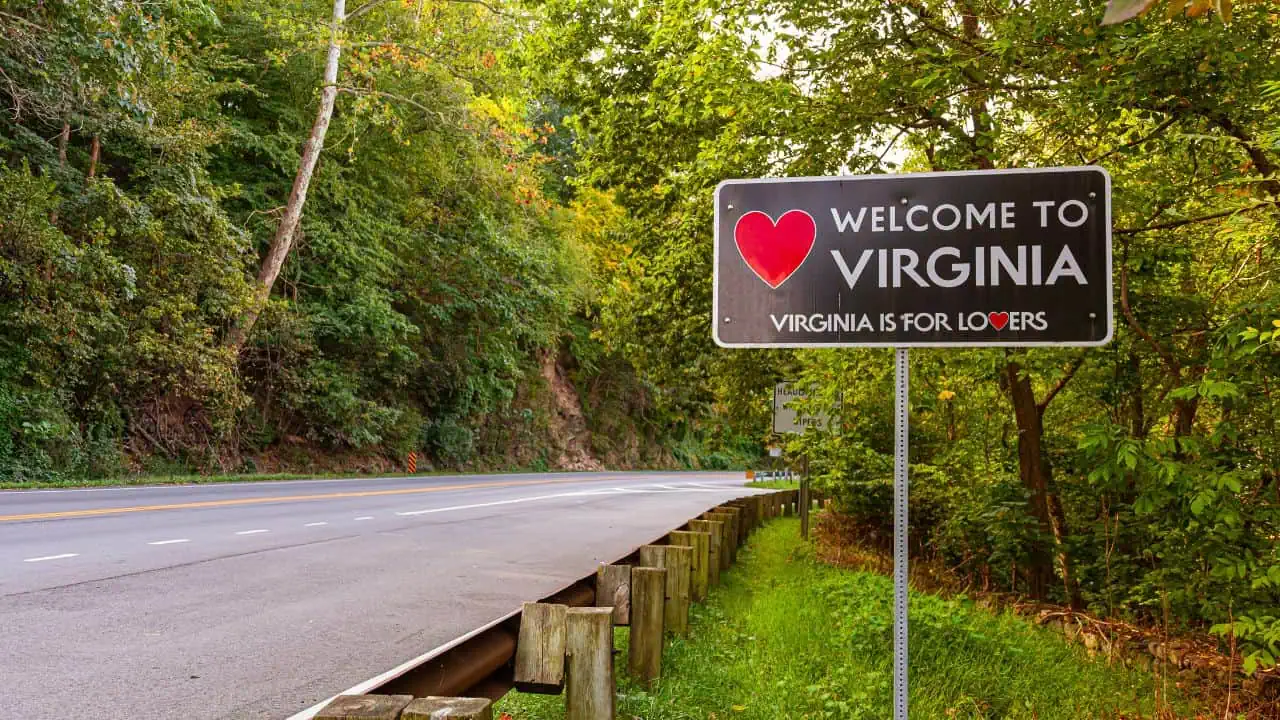If you’re visiting Virginia by car or plan to get a rental, it’s important to understand and follow Virginia’s driving laws.
Virginia is known for its strict enforcement of traffic regulations, so being informed about these rules can help out-of-state drivers avoid fines, penalties, or even jail time during their trip.
Following Virginia’s driving laws ensures safety for all, helps you avoid unexpected expenses, and makes your trip more enjoyable and stress-free.
Virginia has a Hands-Free Device Law
One of the most notable laws in Virginia is the hands-free device law. As of 2021, drivers are not allowed to hold a cell phone while driving.
Whether you’re making a phone call, sending a text message, or using a navigation app, you must use a hands-free system.
There are some exceptions, like emergencies, but generally you cannot have a cell phone in your hand while operating a vehicle. It’s a primarily offense, so they can pull you over for this action alone.
Violating this law can result in fines, with a $125 penalty for the first offense and $250 for subsequent offenses.
Virginia’s hands-free law is definitely an adjustment if your home state is more lenient, so be mindful because you could get pulled over. I’ve witnessed it!
Virginia Speed Limits
Speed limits in Virginia are strictly enforced so pay attention!
Interstate highways generally have a speed limit of 55 to 70 mph unless otherwise posted. On rural roads, speed limits typically range from 55 to 65 mph, while residential and school zones often have much lower limits of 25 mph or less.
Construction zones may have temporarily reduced speed limits, which must be obeyed. Virginia’s law enforcement takes speeding violations seriously, especially those that qualify as reckless driving.
What is considered reckless driving in Virginia? Driving 20 mph over the speed limit or exceeding 85 mph, regardless of the posted limit, is considered reckless driving in Virginia.
Reckless Driving in Virginia
Reckless driving in Virginia is more than just excessive speeding. It also includes aggressive driving behaviors like tailgating, weaving in and out of traffic, and ignoring traffic signals.
Reckless driving charges can result in significant penalties, including fines, possible jail time, and license suspension. These offenses stay on your record and could impact your car insurance rates.
Driving recklessly in Virginia can turn a simple traffic violation into a costly legal matter.
Virginia’s Strict DUI Laws
Driving under the influence (DUI) in Virginia is a bad idea! Virginia is one of the strictest states in the U.S. when it comes to drinking and driving penalties.
Operating a vehicle with a blood alcohol concentration (BAC) of 0.08% or higher is illegal for drivers aged 21 and older. For drivers under the age of 21, the state enforces a zero-tolerance policy, with a legal BAC limit of 0.02%.
Virginia also has an implied consent law, meaning that by driving in the state, you automatically consent to a breathalyzer or blood test if suspected of DUI. Refusal to comply with these tests can result in additional penalties including license suspension.
The consequences of a DUI conviction in Virginia are severe, including expensive fines, lengthy license suspension, substance abuse programs, and potential jail time, particularly for repeat offenders.
Not-So-Fun Fact: The average cost of a DUI in Virginia can range from $5,000 to $15,000. This estimate includes fines, attorney fees, special insurance premiums, and other costs such as court-ordered programs. Not to mention the cost of traveling back and forth for court appearnces.
Just avoid drinking and driving altogether to stay safe and avoid a legal and financial nightmare.
Pedestrian Laws in Virginia
Drivers must yield to pedestrians in crosswalks, whether marked or unmarked. This rule applies to intersections and areas with heavy foot traffic, such as schools, parks, and urban centers.
Failing to yield to pedestrians can result in fines and points on your driving record.
Drivers should be vigilant, especially in densely populated areas. Pedestrians are known to just step out into the roadway while looking down at their cell phones!
Virginia’s “Move Over” Law
Virginia’s “Move Over” law requires drivers to shift to another lane or significantly reduce their speed when approaching stationary vehicles with flashing lights.
This includes emergency vehicles, tow trucks, and utility vehicles. If moving to another lane isn’t possible, drivers are expected to slow down to a safe speed.
Failure to comply can lead to fines and other consequences, especially if an accident occurs.
Seat Belt and Child Safety Laws in Virginia
Seat belt and child safety laws in Virginia are strictly enforced to protect drivers and passengers. All drivers and front-seat passengers are required to wear seat belts.
Passengers under 18 must wear seat belts regardless of where they are seated in the vehicle. For children, additional safety measures must be in place.
Those under the age of eight must use an appropriate child safety seat, and booster seats are required for older children who do not fit into standard seat belts.
Radar Detectors are Illegal in Virginia
One unique aspect of Virginia’s driving laws is its prohibition on radar detectors. Unlike most states, Virginia does not allow drivers to use or even possess radar detectors in a working condition.
This means that visitors who rely on radar detectors in their home states should remove or disable them before driving in Virginia.
Possessing an active radar detector can result in fines, so it’s best to adhere to the speed limits and avoid relying on these devices.
FAQs About Virginia Driving Laws
Are Virginia’s driving laws considered strict? Virginia’s driving laws are strict compared to many other states. The state enforces stringent penalties for speeding, reckless driving, and DUI offenses to prioritize road safety.
Can you drive in Virginia with an international driver’s license? Yes, you can drive in Virginia with an international driver’s license as long as it is accompanied by a valid license from your home country. Make sure to also carry proper identification and follow all local driving laws.
What happens if you get a ticket in Virginia? If you receive a ticket in Virginia, you’ll typically need to pay a fine or appear in court, depending on the severity of the violation. Failing to address the ticket can result in additional penalties, including license suspension.
Does Virginia report speeding tickets to other states? Yes, Virginia typically reports speeding tickets to other states through the Driver License Compact (DLC). This means a violation in Virginia could affect your driving record in your home state.
What happens if I get a DUI in Virginia as an out-of-state driver? Virginia takes out-of-state DUIs seriously and often shares information with other states. If you end up in this situation, it is wise to consult a criminal defense attorney licensed to practice in Virginia.
Can I drive after consuming marijuana in Virginia? No, driving under the influence of marijuana is illegal in Virginia. Learn more about marijuana laws in Virginia.
Virginia Driving Laws Out-of-State Visitors Should Know
Understanding and following these driving laws can help out-of-state drivers navigate Virginia’s roads safely and avoid legal trouble.
The state’s emphasis on road safety is evident in its strict enforcement of these rules. Before hitting the road, you should take a minute to understand what you are driving into!

Alexandrea Sumuel Groves is a Travel Journalist, Yahoo! Creator, MSN Partner, a member of both the Society of Professional Journalists and North American Travel Journalists Association, and the founder of Wander Worthy. She covers vacation destinations, travel news, and tourism trends.
